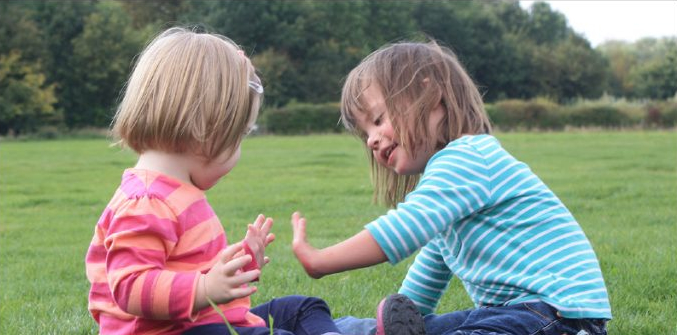
What is Down syndrome?
Down syndrome is a genetic condition where a person is born with an extra copy of chromosome 21 in some or all of the cells in their body. This means that they have a total of 47 chromosomes, rather than the usual 46. Down syndrome is the term used in Ireland, but you may also see the term Down’s syndrome used.

Down syndrome is a lifelong condition. The extra chromosome changes the way the brain and body develop from the very early stages.
Down syndrome affects approximately one baby out of every 444 births here in Ireland. It is currently estimated that there are about 9,000 people in Ireland with Down syndrome.
Frequently Asked Questions
What is a syndrome?
A syndrome is a collection of symptoms and signs that usually occur together and are characteristic of a particular condition.
Are there different types of Down syndrome?
There are three types of Down syndrome:
- Trisomy 21 (95%): an extra copy of chromosome 21 is present in every cell
- Translocation (3-5%): an extra copy of part or all of chromosome 21 is attached to another chromosome
- Mosaic (1-2 %): some cells have an extra copy of chromosome 21, so have 47 chromosomes, while other cells have the usual 46 chromosomes.
Every person with Down syndrome has an extra copy of chromosome 21 in some or all of their cells.
How do we know which form of Down syndrome our child has?
When a child with Down syndrome is born, or if Down syndrome is suspected, a chromosomal analysis is carried out (by blood tests) to confirm the diagnosis and determine the type of Down syndrome the child has.
Did I do anything to cause Down syndrome?
No. Down syndrome is a genetic condition. The genetic difference occurs when the baby is conceived, and is not the result of any actions during pregnancy.
Is Down syndrome hereditary?
Usually not. A very small percentage of cases of Down syndrome may be inherited. Parents should ask their GP or paediatrician if they consider genetic counselling might be advisable.
Can Down syndrome be cured?
Down syndrome is a lifelong condition and cannot be cured, however with the right medical, therapeutic and educational supports, your child’s abilities can be nurtured.
People with Down syndrome, whatever their age, are people first, with abilities, strengths and weaknesses like everyone else. They will need additional support, but this doesn’t prevent people with Down syndrome all over the world leading full and independent lives. The quality of health care, education and community support provided to children and adults with Down syndrome can make a real difference to their quality of life.
Do all babies with Down syndrome have medical problems?
Down syndrome is a chromosomal anomaly that affects the whole body. This means that there are some medical issues that are more common in babies who have Down syndrome than in other babies. There are also some conditions that are less common.
Talk to your GP or paediatrician if you have any concerns about your baby’s health or development as they will be the best person to reassure you or check for any health issues. You can also phone Fiona McGrane, clinical nurse specialist on fiona@downsyndrome.ie or look in our health section for more information.
Many people who have Down syndrome lead active and healthy lives and most conditions associated with the syndrome can be treated or managed.
What will my child be able to achieve?
Like any other child, children with Down syndrome vary in their abilities and achievements. Nobody can tell you what your child can and will achieve. All we know is that there are thousands of people in Ireland with Down syndrome who have accomplished and continue to accomplish, many great things.
Person-First Language
We promote the use of Person First language at all times. To use person first language, simply say the person’s name or use a pronoun first, follow it with the appropriate verb, and then state the name of the disability. When referring to an individual, always describe them as a person with Down syndrome. The correct terminology is capital “D” for Down and small “s” for syndrome e.g. Joe Bloggs is a person with Down syndrome.
References to “a Downs” / “Down syndrome person” are no longer in use. Using person first language shifts our focus from the disability to the person who has dignity, feelings and rights. This subtle but powerful language shift helps us view people with disabilities as capable and deserving of respect.
…more than medical

While there can be an abundance of medical information about Down syndrome, there is not a lot that provides real insight into the realities of having a child with Down syndrome. Our booklet ‘…more than medical’ is a resource to help support families and new parents with a pre or postnatal diagnosis of Down syndrome for their baby.
Remember we are here should you need any advice or support.

We are here to help and support you
Down Syndrome Ireland provides support and services for people with Down syndrome and their families throughout Ireland. If people with Down syndrome and their families require any information or support, please contact us on (01) 426 6500 or email info@downsyndrome.ie.
We are a community of people here to support you – we have a national office and 25 branches around the country.
When you are ready, connecting with Down Syndrome Ireland and your local branch can be a great start to helping you welcome your baby. You can contact any of our branches or call our National Office on (01) 426 6500.
We provide ‘all-through-life’ support to people with Down syndrome and their families with specialists in the areas of health, speech and language, early development, education and adult education – find out more about our support team members or our work.


